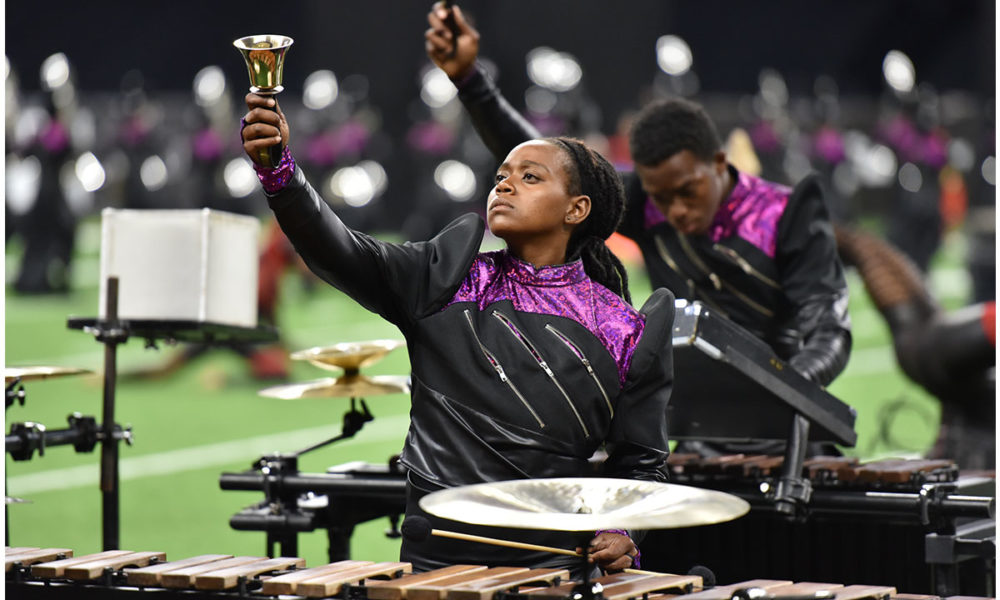 The Sacramento Mandarins placed in the top 12 of Drum Corps International competition for the first time. Director J.W. Koester discusses “Life Rite After” its momentous 2018 season.
The Sacramento Mandarins placed in the top 12 of Drum Corps International competition for the first time. Director J.W. Koester discusses “Life Rite After” its momentous 2018 season.
For the first time in the organization’s 55-year history, the Sacramento Mandarins Drum and Bugle Corps advanced to finals during the Drum Corps International World Championships, performing its show “Life Rite After,” which details the aftermath of the sacrificial virgin’s dance in “Rite of Spring.”
With a final score of 88.150, the Mandarins placed 10th in the 2018 competition. Corps director J.W. Koester reflects on the season.
Halftime: What is your musical background?
Koester: I started taking drum lessons at 9. … I marched with Santa Clara Vanguard in the ’70s. Then I got into management [and] being a drum corps director. I was in management positions with Glassmen [and] Phantom Regiment, went back to Santa Clara Vanguard as a tour director, was the corps director with Spirit of Atlanta, then directed the Mandarins [starting] in [the] 2016 [season].
Halftime: How did the corps react to this year’s finals appearance?
Koester: There was a lot of excitement [after semifinals], but it didn’t really sink in until Saturday night [when] we were actually coming out on the field. For the first time in the corps’ 55-year history, the Mandarins took the field. You could see the expressions on [all the] members’ and staff members’ faces. We’re actually here; we’re actually at the big show on Saturday night.
Halftime: How will making finals impact the corps’ future?
Koester: When I took over in fall 2015, … that started the wheels and process for taking the Mandarins up to that next level. One of the goals was making it into finals. We were in 13th last year, so this year I thought we had a really good chance. Making finals this year is one of the steps of what we want to do in terms of making the drum corps more competitive.
Halftime: What was special about the 2018 season?
Koester: It was an exciting season for the whole season. Going into spring training, I thought we had a special show that the design team had put together. The corps members were embracing the show very well. This corps had a much better effort of getting to know other people in other sections. The entire drum corps just enjoyed being with each other, and it extended all the way to the drivers, the cooks, the volunteers.
Halftime: What did the corps do throughout the season to prepare for finals?
Koester: [We were] continually enhancing and making the show stronger and reinforcing the performers individually. … From a competitive standpoint, we got to go head to head with folks we’d never been competitive with before, and we held our own with that. The scores went beyond what we’d ever done as a drum corps. The whole organization, staff members, support groups, and everyone was like, “These are all good things, but it’s not the end goal.” Staying focused helped us all.
Halftime: What challenges did the corps face and overcome during the season?
Koester: We had a fairly large stage that we used as our prop. At our first show, we walked out on the field and decided there’s no way we can roll our stage onto the field. The grass was too soft. … When we told [the members] it was a no go, nobody freaked out or got wound up. … They went out and did a strong show.
Halftime: What is your advice for other directors?
Koester: You always need to stay true to your ideals and beliefs in doing what you think is right for your organization. … If you compromise them, you’re in trouble.
Halftime: What is your advice for marching musicians?
Koester: You have to do what your heart is calling, what your passion is, whatever that might be. If it’s to march with the same corps for six years, you figure out how to do it. If it’s teaching, you gotta do that. Follow your path.


